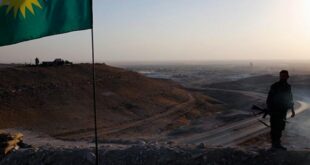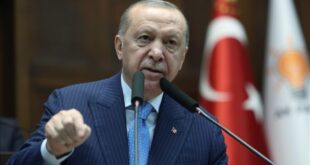A glance at a global map tracking the spread of the coronavirus just one week ago would have shown a large blank space south of Russia, north of Iran, and west of China as an area completely free of the virus.
That blank space is the territory where the five Central Asian states — Uzbekistan, Turkmenistan, Tajikistan, Kyrgyzstan, and Kazakhstan — are located.
Until March 13, when authorities in Kazakhstan confirmed the country’s first four cases, none of the Central Asian states reported any confirmed cases, despite being on the doorstep of two countries with the worst outbreaks in the world, China and Iran.
Two days later, Kazakhstan said there were five confirmed cases and Uzbekistan reported its first case.
By March 18, Kyrgyzstan confirmed its first three cases, all passengers on a flight arriving from Saudi Arabia.
Little Coordination
There has been little coordinated action globally in combating the coronavirus.
The World Health Organization is tracking the virus, reporting on its spread, and offering governments advice on how to slow the virus’s transmission, but so far, every country is dealing with the virus as individual governments see fit.
Central Asia is no different, though in that region it often seemed like no government wanted to be the first to take measures that might give the impression the coronavirus was present on their territory.
So the reactions have been staggered, though gradually some are adopting the same tactics.
The Norouz holiday is coming on March 21. The celebration dates back to Zoroastrian culture, marking the start of spring, and for centuries it has been one of the holidays in Central Asia.
Kyrgyzstan was the first to call off its Norouz celebration. On March 9, the government specifically banned the large celebrations set for the holiday around the country and, on March 17, banned any gatherings of more than 50 people.
Three days later Kazakhstan announced a ban on all public celebrations, sport events, meetings, and conferences, a day before officials announced the first confirmed cases of coronavirus.
As recently as March 13, the Gazeta.uz website reported that Uzbekistan was planning to go ahead with Norouz, but just two days later, after Uzbek authorities confirmed the first case of coronavirus in the country, Prime Minister Abdullo Aripov announced all mass gatherings, including “large events connected with the celebration of Novrouz, were canceled.”
Tajikistan — where as of March 18 there are no reports of coronavirus infections — is still going ahead with its plans to mark Norouz.
RFE/RL’s Tajik Service, known locally as Ozodi, reported on March 13 that the central square in the capital, Dushanbe, was decorated and ready for the festivities, even if some of the people in country were not in festive moods and a huge event was planned in the northern city of Khujand, where President Emomali Rahmon is scheduled to attend the celebrations.
In Turkmenistan — where officials have great difficulty even saying the word “coronavirus” out loud — the government is better known for forcing people to attend state-sponsored gatherings and this year is no exception.
People around the country are again being called away from jobs and their homes to rehearse for this year’s Norouz celebrations.
Skip The Mosque
Similarly, the five governments have taken different approaches to their treatment of schools and mosques.
In Tajikistan, schools are open but at the start of March some imams in Dushanbe told the faithful to stay away from mosques and perform their prayers at home. One imam said the move was being made “for the prevention of the spread of the coronavirus.”
In Kazakhstan, a March 13 declaration from the Spiritual Board of Muslims left mosques open but instructed them to skip the 30-minute sermon at the start of namaz, or the Islamic worship service, and advised performing ritual ablutions at home before coming to the mosque, wearing a mask when going to the mosque, avoiding handshakes, and leaving quickly after prayers end.
On March 15, Kazakhstan declared a state of emergency lasting until April 15 and, the following day, President Qasym-Zhomart Toqaev said that meant schoolchildren would be on extended vacation and university students would work online.
The Spiritual Board of Muslims followed by announcing, “In connection with the government’s declaration of a state of emergency, and with the great risk of spreading the illness, mosques will temporarily suspend Friday Prayers.”
In Uzbekistan, all schools — from preschool to university — are closed for a certain vacation and during this time state television will run educational programming.
On March 16, Uzbekistan’s Spiritual Board of Muslims temporarily canceled Friday Prayers at mosques and recommended the faithful perform their prayers at home.
Kyrgyzstan’s Security Council met on March 14 and ordered all schools and universities closed for three weeks starting on March 16, but kindergartens will remain open.
That same day, the Spiritual Board of Muslims of Kyrgyzstan followed Kazakhstan’s example and ordered Friday Prayer services be shortened and for the elderly, women, and children to stay at home, but on March 17, when authorities announced the impending closure of Kyrgyzstan’s borders, the Spiritual Board ordered the temporary cancellation of Friday Prayers at mosques in the country and told people to say their five daily prayers at home.
By contrast, Turkmenistan has not canceled school at any level.
Mosques remain open and imams continue to lead prayers for the health of President Gurbanguly Berdymukhammedov and his family.
Closing Borders
All five countries have canceled most or all flights to and from other countries and drawn up lists of foreign nationals who either are temporarily denied entry or must undergo a period of quarantine upon entry.
Turkmenistan — which like Tajikistan has not officially reported any coronavirus cases as of March 18 — had redirected all flights arriving from outside the country to the Lebap airport in the eastern part of the country, where authorities have established a quarantine area where at least dozens of people are being kept.
Tajikistan has taken a confusing path, first banning flights to and from 35 countries at the end of February but, on March 3, reduced that to just five countries — China, Iran, Afghanistan, Italy, and South Korea.
On March 16, flights to Uzbekistan and Russia were canceled in response to those countries canceling flights from Tajikistan.
Uzbekistan and Kazakhstan closed their borders immediately after the first cases of coronavirus were confirmed.
Kyrgyzstan followed on March 17, announcing it was prohibiting foreigners from entering the country, though Tajikistan’s border with Kyrgyzstan was still open as of March 17.
Kazakh authorities announced on March 17 that the country’s two main cities — Almaty and the capital, Nur-Sultan — would be under quarantine starting on March 19. Checkpoints will be established to control movement in and around the two cities and as of March 18, troops from the Kazakh military’s biological-defense units had already begun disinfection work.
Governments in Kazakhstan, Kyrgyzstan, Tajikistan, and Uzbekistan continue to assure their citizens there is no reason for panic and that all basic goods will remain in sufficient supply and at fixed prices for everyone.
Despite these assurances, there have been reports of people in Tajikistan and Uzbekistan racing to stores and bazaars to stock up on goods in anticipation of future shortages, and reports of sharp price increases in all five countries.
Similar reports emerged from the Kyrgyz capital, Bishkek, on March 17 after the first cases of coronavirus were announced in Kyrgyzstan.
In a positive development, the presidents of Kazakhstan and Uzbekistan discussed the coronavirus problem by telephone on March 18, one of the very few signs of regional cooperation in dealing with this common threat.
Turkmenistan has been in a severe economic crisis for more than four years, never admitting publicly there were any problems, and the government there continues to avoid any mention of the virus or problems with medicine or food supplies, which are a fact of life for Turkmen.
But President Berdymukhammedov did recently recommend to his citizens resorting to the traditional cure of burning the wild rue plant to ward off diseases.
Turkmenistan is surrounded by countries that have reported cases of the coronavirus, and southern neighbor Iran continues to be one of the world’s hot spots for the virus.
Nevertheless, the Turkmen government is unlikely to confirm any cases unless the situation becomes extremely dire.
 Eurasia Press & News
Eurasia Press & News



